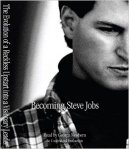 Last Friday, I presented my synopsis of Becoming Steve Jobs: The Evolution of a Reckless Upstart into a Visionary Leader (Crown Business (March 24, 2015) by Brent Schlender and Rick Tetzeli. It is a terrific book, and one that adds greatly to our understanding of the life, and impact of, Steve Jobs. He really was one of a kind!
Last Friday, I presented my synopsis of Becoming Steve Jobs: The Evolution of a Reckless Upstart into a Visionary Leader (Crown Business (March 24, 2015) by Brent Schlender and Rick Tetzeli. It is a terrific book, and one that adds greatly to our understanding of the life, and impact of, Steve Jobs. He really was one of a kind!
You probably know the story. He ushered in the most user-friendly technological breakthroughs of our lifetime. But, as a person, he went from being quite a jerk to much less of a jerk. How did this happen – how did Steve Jobs “become” Steve Jobs? From the book:
THE MOST BASIC question about Steve’s career is this: How could the man who had been such an inconsistent, inconsiderate, rash, and wrongheaded businessman that he was exiled from the company he founded become the venerated CEO who revived Apple and created a whole new set of culture-defining products that transformed the company into the most valuable and admired enterprise on earth and that changed the everyday lives of billions of people from all different socioeconomic strata and cultures? The answer wasn’t something Steve had ever been all that interested in discussing.
In my synopsis presentation, I included these five observations:
- Steve Jobs needed a mentor – Ed Catmull (Pixar), a Great Mentor for Steve
- Steve Jobs was (always) a great Storyteller (No one could match him in his preparation for a presentation)
- Steve Jobs was a great negotiator – a deal reader; a deal maker
- Steve Jobs treasured and demanded Loyalty
- Steve Jobs was always “waiting for” the technology to catch up
- He seemed to always be ahead of the technology
And here are my six lessons and takeaways from the book:
#1 — To quote Walter Isaacson, maybe Steve Jobs is simply not “replicable.”
#2 — To Steve Jobs, “company” was always means to the greater (greatest) end – product.
#3 — He really, really wanted technology to be “invisible,” a tool for the utterly technologically uninitiated.
#4 — Sure, small improvements are needed, and good. But, the big, big breakthroughs are what “push the human race forward” (Think Different).
#5 — You can’t fake it, or pull it out of thin air. Steve Jobs loved music; he loved beauty; he understood technology; he believed deeply in the centrality of “product.” This combination is probably what makes him “not replicable.”
#6 — Even Steve Jobs (especially Steve Jobs) needed a mentor. Ed Catmull was the right person, at the right time, to fill that role.
I think that if you want to learn the full Steve Jobs story, then you will want three books on your reading stack. First, Walter Isaacson’s authorized biography, Steve Jobs. Then, Ed Catmull’s wonderful book, about Pixar and Walt Disney Animation Studios and Steve Jobs, Creativity, Inc. And this one, Becoming Steve Jobs. Read these three, and you will come away with a pretty full picture of this modern-day business genius.
——————–
 My synopsis, with the comprehensive handout and the audio of my presentation, will be available soon on our companion site, 15minutebusinessbooks.com.
My synopsis, with the comprehensive handout and the audio of my presentation, will be available soon on our companion site, 15minutebusinessbooks.com.
